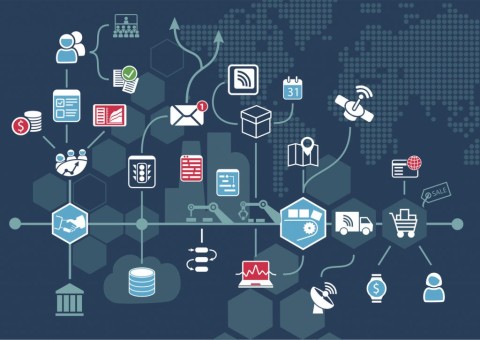Lately, tales of how the Internet of Things (IoT) have become a common staple of tech conversations. IoT devices have the potential to produce humongous volumes of data (a reason we usually hear Big Data and IoT in many presentations). We like to picture zillions of sensors generating gazillions of bytes, while the CIOs are tasked to find ways to handle the impending data tsunami. But, will this Big Data ever be useful in real-time?
Whether it is stopping that self-driving car from hitting that seemingly unaware pedestrian, or changing a delivery drone route based on last minute weather information, there will be some moments where a huge amount of data won't necessarily make a significant difference on the immediate outcome. This will be the territory of smart devices. And no, your smartphone is not a smart device.
These are incredible tools enabling us to become more productive (When you have the right tools in supply chain planning you can be.), but they are helpless without us. They are attention-seeking toddlers, capable of many things. But they have no clear definitions of good or bad behaviors, and they have no sense or purpose without someone there to guide them. I can't tell my phone to go charge himself, I can't tell him to make me a coffee, and certainly I wouldn't trust it talking to strangers all by itself. Same thing applies to many of the "smart" devices that help us drive our production lines and distribution routes.
If we really want to step up our supply chain game, we need these devices to grow and become reputable members of the IoT society. These devices will need to be capable of performing unassisted tasks involving some levels of uncertainty and be able to take care of themselves (self-preservation) while providing for the family (generating revenue), all while hopefully not hurting any human in the process (Skynet might disagree). They will also need to be capable of something that is not that easy for even humans to do: trusting others and being trusted by its peers, collaborating and competing, and pushing the envelope all the way it can go and then some.
To achieve this, artificial intelligence (AI) is not enough. After all, we, the intelligent humans, require tools to assess the trust we place on others. There's a reason we have things such as police and credit score checks, as well as auditable accounting books. Machines will need a hand when looking to trust (or not to trust) other machines. If only we had such a technology, right? Well, it turns out there is a promising one. It's called Blockchain, a technology the Economist recently labeled as the trust machine, as it "lets people who have no particular confidence in each other collaborate without having to go through a neutral central authority. Simply put, it is a machine for creating trust." Yes, you read right, they mention people, but this is being extended to machines, too. An example is this delivery, made using a drone enabled with a blockchain-registered chip, where the creators claim the drone was able to identify itself to the "self-authenticate with a computer-controlled window and gain access to a private residence in order to deliver a package."
To me, this sounds like a teenager climbing into your window - both exciting and a bit scary at the same time. We are not there yet, but this is more than just programming a drone to perform a delivery. We can do that already thanks to Amazon. This is about being able to tell a device to perform a task, without having to break down every single task involved. Eventually, I could tell the drone to go deliver a package to X address without having to program beforehand the platform it will pick it up from, the path it should take, which recharging station to use and so on. Let the devices figure it out. But what if someone comes and tells them to do otherwise (i.e. hacking)?. Well, if the right incentives are in place, they would have to figure out the right thing to do, as they would have a reputation to maintain. Bad behaviors will cost them (imagine if spam mailers had to pay a penny for each mail they deliver), and since they will no longer be considered “children” anymore, they could be rewarded or punished accordingly.
Look, the technicalities behind the Blockchain, the current backbone of the Bitcoin cryptocurrency, are not for the faint of heart. All the coding and cryptography involved are no small pills to swallow. It doesn't help much that Bitcoin has been associated with shady deals. But, as the Economist points out, a similar thing happened with the file-sharing Napster, which long ago perished but whose underlying technology (peer-to-peer or P2P) endured and ended up in the backbone of serious (and legit) businesses. Blockchain could give IoT devices a chance to obtain an identity, to be able to cooperate and transact without our assistance, a chance to grow up and carry on business out of our sight. That's a pretty exciting thing that could happen in our lifetimes... if we let them grow. Now it's your turn, have you heard about Blockchain before? What are your thoughts on the possibility of having increasingly independent, yet cooperative devices?





Leave a Reply